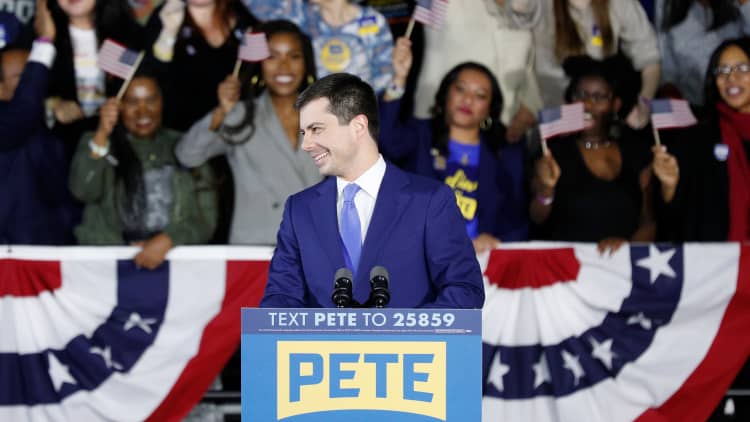
Results from the first-in-the-nation Iowa caucuses were delayed as the state's Democratic Party said a "reporting issue" caused "inconsistencies" in some data.
As the party's struggle to put out results dragged into Tuesday morning, the leading candidates in Iowa — Sen. Bernie Sanders, former Vice President Joe Biden, former South Bend Mayor Pete Buttigieg, and Sens. Elizabeth Warren and Amy Klobuchar — put an optimistic gloss on their performances and looked ahead to the Feb. 11 New Hampshire primary. The candidates had plans to head to the Granite State on Tuesday — with the Iowa caucuses behind them.
Doors at caucus sites across the Hawkeye State closed at 8 p.m. ET on Monday, when voters worked through a frenetic process of persuasion and changing allegiances to pick their favorites in the 2020 presidential nominating contest. By about 11:30 p.m. ET, Iowa Democratic Party spokeswoman Mandy McClure said the party "found inconsistencies in the reporting of three sets of results."
She added that, "in addition to the tech systems being used to tabulate results, we are also using photos of results and a paper trail to validate that all results match and ensure that we have confidence and accuracy in the numbers we report."
"This is simply a reporting issue, the app did not go down and this is not a hack or an intrusion. The underlying data and paper trail is sound and will simply take time to further report the results," McClure said.
The contest was too early to call, according to NBC News, as the party worked to release results. A source told NBC News that technical glitches hit an app for reporting results and a backup phone line for relaying information was "a disaster."
In a statement early Tuesday, Iowa Democrats Chairman Troy Price said the results will be released later in the day and the party is manually verifying its data.
The Iowa party held a testy call with Democratic campaigns, and party representatives hung up when campaigns pushed to learn more about the reporting problems and when they would see results, two Democratic campaign staffers told NBC News.
Read more:
Here's what happens after the chaos in Iowa
Iowa caucus: What it is, how it works and why it's important
Democrats get their first chance to choose their 2020 presidential candidate in Iowa
Most of the top Iowa candidates spoke to supporters as the party tried to tabulate results. As confusion swirled around the results, the candidates all talked up their performances in Iowa.
"By all indications, we are going on to New Hampshire victorious," Buttigieg said to applause.
Sanders dryly poked at the delay as he spoke to backers.
"Let me begin by stating that I imagine, have a strong feeling, that at some point the results will be announced," the Vermont senator said to cheers Monday night. "And when those results are announced I have a good feeling we're going to be doing very, very well in Iowa."
Behind the scenes, campaigns appeared more frustrated with the reporting delays.
A Biden campaign lawyer sent a letter to the state party saying "we believe that the campaigns deserve full explanations and relevant information regarding the methods of quality control you are employing, and an opportunity to respond, before any official results are released," NBC News reported.
The data problems muddied a period of time when campaigns typically try to declare victory or put a positive spin on their performances. A strong showing in the Iowa — or even a showing better than perceived expectations — can boost fundraising and give candidates a measure of legitimacy.
Typically, but not always, the winner in Iowa goes on to become the Democratic Party's presidential nominee.
Early data indicate turnout was about on pace with the 2016 caucuses, McClure said earlier Monday. Turnout four years ago was about 171,000, well below the record levels of 2008, according to NBC News.
Iowa caucus voters were overwhelming white, according to entrance polling data. More than half, or 58%, identified as women, while 42% identified as men.
Just over a quarter, or 27%, of attendees were 65 or older. With 28% of respondents, the biggest group was 45 to 64-year-olds. Another 24% were 17 to 29 years old, while 21% were between 30 and 44.
Sanders typically performs better with younger voters, while Biden is stronger among older voters.
The top issues for Iowa caucus voters reflected trends seen nationally: 42% said health care mattered most in deciding who to support, while 21% answered climate change, 18% said income inequality, while 13% chose foreign policy.
More than half, or 57%, of respondents said they support replacing all private health insurance with a single government plan, while 38% answered that they oppose such a system. Sanders and Warren want to move to single-payer health insurance, while Biden, Buttigieg and Klobuchar do not.
Self-described liberals more than doubled those who identified as moderates, by a 68% to 32% margin, the entrance polls found.


